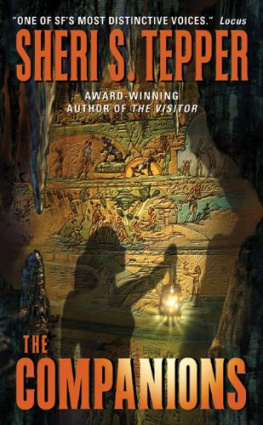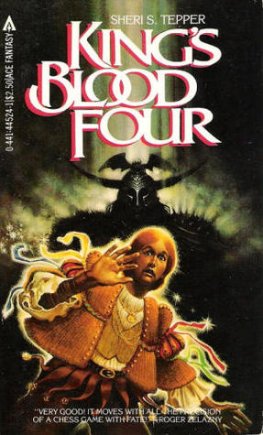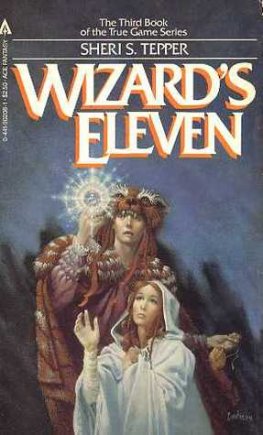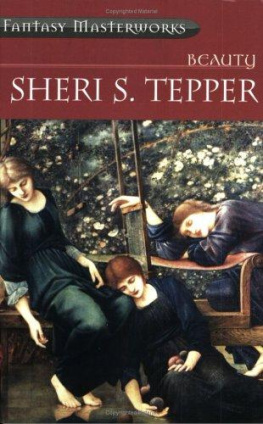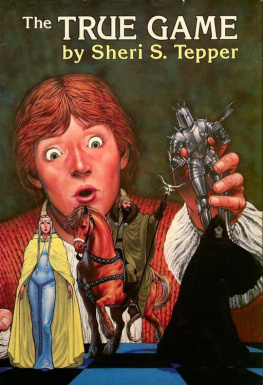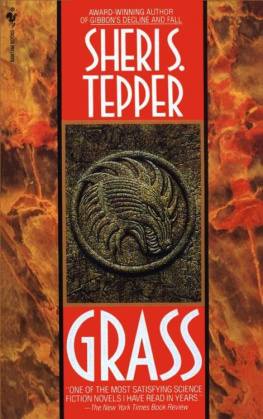Sheri S. Tepper - The Companions
Here you can read online Sheri S. Tepper - The Companions full text of the book (entire story) in english for free. Download pdf and epub, get meaning, cover and reviews about this ebook. year: 2004, publisher: Harper Voyager, genre: Detective and thriller. Description of the work, (preface) as well as reviews are available. Best literature library LitArk.com created for fans of good reading and offers a wide selection of genres:
Romance novel
Science fiction
Adventure
Detective
Science
History
Home and family
Prose
Art
Politics
Computer
Non-fiction
Religion
Business
Children
Humor
Choose a favorite category and find really read worthwhile books. Enjoy immersion in the world of imagination, feel the emotions of the characters or learn something new for yourself, make an fascinating discovery.
- Book:The Companions
- Author:
- Publisher:Harper Voyager
- Genre:
- Year:2004
- Rating:5 / 5
- Favourites:Add to favourites
- Your mark:
- 100
- 1
- 2
- 3
- 4
- 5
The Companions: summary, description and annotation
We offer to read an annotation, description, summary or preface (depends on what the author of the book "The Companions" wrote himself). If you haven't found the necessary information about the book — write in the comments, we will try to find it.
Sheri S. Tepper: author's other books
Who wrote The Companions? Find out the surname, the name of the author of the book and a list of all author's works by series.
The Companions — read online for free the complete book (whole text) full work
Below is the text of the book, divided by pages. System saving the place of the last page read, allows you to conveniently read the book "The Companions" online for free, without having to search again every time where you left off. Put a bookmark, and you can go to the page where you finished reading at any time.
Font size:
Interval:
Bookmark:

IN LOVING MEMORY OF KYBO, SKEETER,
TIBBY, BEANS, TIBESKIBO, SCHMUTZIE,
MOGUL, MELITZA, MUFFY, AND ALL THE
LEGION OF DEPARTED COMPANIONS,
AND WITH JOYOUS APPRECIATION OF
PUPUP AND LULABELLE, THE CURRENT
GLAD REVENANTS OF THE SPECIES
elemental, monumental, fine phantasmic elephants;
hairless hippopotami, huddled close as spoons;
riotous rhinoceri, roistering on grasslands;
tiny tender tarsiers, eyes like moons;
plump pied pandas, pretty as a picture;
gay, giggling gibbons, gamboling in the trees;
awlnosed aardvarks, excavating anthills;
glowering gorillas lollygagging at their ease.
light on the leaf mold, feather-footed field mouse,
tiny as a hazelnut, the bloodthirsty shrew
off in the outback, wombat, numbat,
gone to have a meeting with kid kangaroo
bulky-shouldered bison, built like a bastion,
wily alligator, floating like a log
wolf in the wildlands, jackal in the jungle,
dutiful and diligent, mans friend, dog.
horrible hyenas, hairy noses quivering;
wildly running wildebeests, sometimes called the gnu,
laugh-provoking lemurs, loitering on tree limbs,
melancholy mandrill with his bottom painted blue
overbearing ostrich, fluttering his feathers
boulder-bounding ibex, helmed like a knight
curve-backed camel, king of the desert
prickly, stickly porcupine no animal will bite
big brown bruin bear, walking as a man does
toucan with a great tall trumpet for a nose
bald-headed vultures, vittling on vipers
(vultures will eat anything as everybody knows)
mad male orangutan, face like a soup bowl
curious xenopus, peculiarly made
quagga, quail, and quetzal, quaint concatenation .
solitary tiger, strolling in the shade
loudmouthed jackass, braying jeremiads;
bald-faced uakaris, kinky kinkajou;
high hairy travelers, yaks upon the mountain;
bringing up the rear with Zebra and Zebu.
The moss world, so said one XT-ploitation writer who had reviewed first-contact images of it, was a Victorian parlor of a planet, everywhere padded and bolstered, its cliffs hung with garlands, its crevasses softened with cushions, every cranny silk-woven, every surface napped into velvet. Here were peridot parklands where moss piled itself into caverned outcrops of sapphire shade. There were violet valleys, veiled in lavender and wine across a mat of minuscule, multicolored moss beads. In that clearing the morning light shone on infant parasols, ankle high, that by noon had sprung upward to become umbrellas, guyed with hair-thin fibers, ribs flung wide to hold feather-light sails that turned softly, softly through the afternoon, shading the sporelings beneath.
Along the canyons were fragrant forests where every footfall released scents that evoked aching nostalgia, as though racial memory held sensations undetected for centuries: Cedar perhaps? Sandalwood? Maybe pion or frankincense? Maybe something older than any of those? The riversides were endless alleys cushioned in aquamarine and jade, hung with curtains that moved like the waves of a shifting ocean, hiding, then disclosingso it was claimedthe flame-formed inhabitants of this place.
If, that is, the Exploration and Survey Corps really saw them. If the people from Planetary Protection Institute really saw them. After each sighting the men sought confirmation from their complicated devices and found no evidence of the beings they had perceived. The machines confirmed small grazing and burrowing creatures, yes; they confirmed tall, gaunt trees that served as scaffolding for the epiphytic fabric of the world, but these othersthese wondersEveryone described the same shapes, the same behaviors, the same colors. Formed like flames, endlessly dancing, an evanescent blaze in the morning, a shimmering shadow in the dusk. Rarely seen, unmistakable when seen, but never yet recorded
Along that ridge, shining, a whole line of them
Right. I saw them. Like huge candles
What had they seen? That was undoubtedly the question.
A Garrugh shipclan of the Derac, a race nomadic by nature, had found Moss quite by accident when their clan-ship was sucked into an instability at one arm of the galaxy and spewed out in another. Subsequently, the exploration and survey of the three inner planetsthe rock world, the jungle world, the moss worldwere farmed out on shares to Earthian Enterprises. The Derac were accustomed to farming out work to Earthers. Humans prided themselves on their workan emotion felt, so far as anyone knew, only by humans, as most other starfaring races considered work a sign of serfdom, which among them it invariably was. Earthers felt differently. They had their own Exploration and Survey Corps, ESC, and their own Planetary Protection Institute, PPI, a branch of the Interstellar Planetary Protection Alliance, of which Earth was a member. More importantly, Earthers were a settling type of people who seemed not to mind staying in one place as long as it took to do an adequate job of assessing new planets. Accordingly, Earth Enterprises, on behalf of PPI and ESC, was awarded a contract by the Derac to explore and survey, using, of course, the IPPA guidelines governing such activities on newly discovered worlds.
Accordingly they came. They saw. They were conquered.
Two-thirds of the planets surface was taken up by the mosslands where the Earthers sought to answer IPPAs primary question: Did a native people exist? Time spun by, a silver web; they felt what they felt and saw what they saw, but they could not prove what they felt or saw was real. They thought, they felt there was a people, peoples upon Moss, but did a people really exist?
Did the men and women of PPI themselves exist? Their days on Moss went by like dreams passed in a chamber of the heart, a systole of morning wind, a throb of noon sun, an anticipatory pulsation of evening cool that was like the onset of apotheosis, a day gone by in a handful of heartbeats as they waited for something marvelous that would happen inevitably, if they were simply patient enough.
Patience wasnt enough. IPPA required specific information about newly discovered worlds. Was the ecology pristine or endangered? Were there intelligent inhabitants, and if there were, were they indigenous, immigrants, or conquerors? Did they occupy the entire planet? Were they threatened? Did they consider themselves a part of or the owners of the world on which they lived? Were other races of intelligent creatures native to the world, or had any been imported or rendered extinct? If there were various views on these matters among the inhabitants, might they be amenable to referring the matters to IPPA for resolution? These questions had to be answered! These and a thousand more!
Moss could not be opened to habitation, trade, or visitation until it was certified by IPPA. Moss could not be certified by IPPA until the information was received. The information could not be received until the blanks in the forms were filled in, but the blanks in the forms remained exactly that.
How could one determine prior claims from creatures that fled like visions? Were they inhabitants? Possibly, though they were as likely to be events. Often, truly, they seemed to be hallucinogenic happenings, light and motion flung together by wind and imagination. Perhaps they were a new kind of creature: ecological animations! Such suggestions met with incomprehension back on Earth, where the carbon life-form branch office of IPPA was located.
Font size:
Interval:
Bookmark:
Similar books «The Companions»
Look at similar books to The Companions. We have selected literature similar in name and meaning in the hope of providing readers with more options to find new, interesting, not yet read works.
Discussion, reviews of the book The Companions and just readers' own opinions. Leave your comments, write what you think about the work, its meaning or the main characters. Specify what exactly you liked and what you didn't like, and why you think so.

